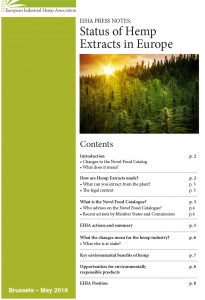The European Industrial Hemp Association (EIHA) has published a collection of historical evidence documenting the consumption hemp food and hemp food extracts in Europe to counter recent European Union rule changes stakeholders say put the sector in jeopardy.
The 8-page document, “Status of Hemp Extracts in Europe,” cites a number of references aimed at demonstrating the presence of hemp extracts — including CBD — in food consumed on the continent throughout history.
The effort is part of an ongoing* push by EIHA to help media and EU officials understand the issues surrounding extracts derived from hemp flowers and leaves — and to draw press and public attention to a situation EIHA has said threatens to disrupt the entire – and fast-growing – hemp food business throughout EU Member State markets.
An update on the situation is on tap at this year’s EIHA Conference June 5-6 in Cologne, Germany.*
‘Consistent, relevant’ evidence
The 8-page fact sheet, which is being distributed to major international media outlets with bureaus in Brussels and elsewhere, offers “consistent, relevant and accurate evidence proving that hemp leaves/flowers were consumed to a significant degree (in Europe) prior to May 1997.”
The effort by EIHA aims to reverse recent changes to the EU’s Novel Food Catalogue, essentially a food safety mechanism created to control new, genetically or synthetically designed food products before market entry while at the same time protecting the functioning of the Single Market.
Under general Catalogue rules, food that was not consumed to a considerable degree by citizens of the EU prior to 1997, when the first regulation on novel food came into force, are considered “novel,” and must undergo a lengthy and costly compliance regime. Novel food can be newly developed, innovative food, food produced using new technologies and production processes, and food traditionally eaten outside the EU.
The body of rules requires such foods be safe and be properly labeled so as not to mislead consumers, among other requirements.
But EIHA’s research clearly shows such foodstuffs were consumed on the continent prior to the 1997 cutoff, offering examples that stretch as far back as the 12th century.
What EIHA wants in food rules
The Association calls for the Novel Foods Catalogue to exempt hemp leaves and flowers, extracts derived from traditional extraction methods, and naturally occurring CBD from whole plant extracts. Only CBD isolate and food compounds from genetically modified plants would be required to be under Catalogue rules, according to EIHA recommendations offered in the paper.
Under the Catalog now, “all food/food supplements products containing hemp leaves/infructescence (tea, snacks, muesli etc.) or containing hemp extracts now need to obtain a pre-marketing authorisation in order to be placed on the market,” EIHA notes. The process takes two years and can cost as much ast €300,000 per product, according to EIHA.
“Only large operators and corporations will be able to a afford the authorisation process. This way, Small and Medium Enterprises which mainly compose the EU market today, will be naturally left out of the market,” the Association noted.
“If Europe will not allow FBOs to fully exploit the plant, as a direct consequence the EU hemp sector will collapse in favour of other markets, such as U.S., Canada, Switzerland and China,” EIHA further warned in the document.
Food standards in place
As for food safety, EIHA notes that hemp food operators in Europe put their products up against stringent standards already: “Many Food Business Operators (FBOs) in Europe voluntarily comply with ‘marketability certificates’ issued by private institutions that guarantee an appropriate safety level (ISO 22000, HACCP, BRC, etc.) for European consumers,” the Association said in the statement. “Great effort is placed by FBOs to provide consumers with the highest quality products to avoid any negative consequence in term of image for the entire thriving sector.”


